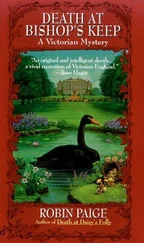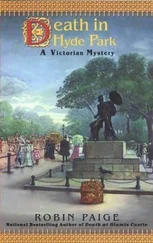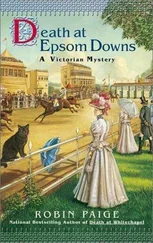Robin Paige - Death at Blenheim Palace
Здесь есть возможность читать онлайн «Robin Paige - Death at Blenheim Palace» весь текст электронной книги совершенно бесплатно (целиком полную версию без сокращений). В некоторых случаях можно слушать аудио, скачать через торрент в формате fb2 и присутствует краткое содержание. Жанр: Классический детектив, на английском языке. Описание произведения, (предисловие) а так же отзывы посетителей доступны на портале библиотеки ЛибКат.
- Название:Death at Blenheim Palace
- Автор:
- Жанр:
- Год:неизвестен
- ISBN:нет данных
- Рейтинг книги:4 / 5. Голосов: 1
-
Избранное:Добавить в избранное
- Отзывы:
-
Ваша оценка:
- 80
- 1
- 2
- 3
- 4
- 5
Death at Blenheim Palace: краткое содержание, описание и аннотация
Предлагаем к чтению аннотацию, описание, краткое содержание или предисловие (зависит от того, что написал сам автор книги «Death at Blenheim Palace»). Если вы не нашли необходимую информацию о книге — напишите в комментариях, мы постараемся отыскать её.
Death at Blenheim Palace — читать онлайн бесплатно полную книгу (весь текст) целиком
Ниже представлен текст книги, разбитый по страницам. Система сохранения места последней прочитанной страницы, позволяет с удобством читать онлайн бесплатно книгу «Death at Blenheim Palace», без необходимости каждый раз заново искать на чём Вы остановились. Поставьте закладку, и сможете в любой момент перейти на страницу, на которой закончили чтение.
Интервал:
Закладка:
Robin Paige
Death at Blenheim Palace
CHAPTER ONE
Friday, 8 May, 1903 Ashmolean Museum, Oxford
The Ashmolean Museum, the oldest public museum in Britain, houses the University of Oxford’s unrivaled collection of art and antiquities from Europe, the Middle East, and Asia.
The Ashmolean Museum, Arthur MacGregor“Oh, sir!” the boy cried excitedly, as John Buttersworth stepped into the conservation laboratory in the basement of the Ashmolean. “The shipment from Crete has arrived at last! Shall we open it, sir?”
Buttersworth regarded the large wooden crate in the middle of the floor. He did not mind the administrative routine of his post as Curator of Classical Collections, and he particularly enjoyed the business of setting up exhibits, such as the display of items from the Knossos excavation, scheduled to open next week. But the happiest moments in his life came when he could indulge his heart’s true passion: holding and fondling the objects themselves, each one with its own beauty, its own history, its own secret story. Ah, yes, the shipment from Crete. He rubbed his hands together.
“Well, then, my boy,” he exclaimed. “By all means, let’s have a go at it!”
Ned Lawrence fetched a long screwdriver and a hammer so ancient that it might have been mislaid from a Roman collection, and eagerly attacked the crate. Buttersworth stood to one side, admiring the deft way the boy handled the tools. Robust and sturdy, young Lawrence had the maturity and discipline of someone much older, and he stood out from all the other Oxford lads who hung about the museum, professing an interest in antiquities and begging to go on the local digs. He was a great favorite among the staff, all of whom felt that, as an archaeologist, he had the stuff in him to go far.
In a few moments, Ned had the lid up and off. Inside, packed in clean straw, were a number of smaller crates, with a large envelope on top. Buttersworth opened the envelope, removed a typed inventory, and began to compare the numbers with those stamped on the small crates that Ned lifted out and stacked to one side. There were nearly a dozen of them.
Buttersworth took off his gold-rimmed spectacles and polished them on his pocket-handkerchief. “Let’s start with this one,” he said, nodding at the top crate. “It should contain a five-inch Roman green glass pitcher.”
Ned placed the small crate on the bench and applied the hammer and screwdriver until the top came loose. Buttersworth pushed the straw aside and carefully lifted out a small blown-glass pitcher. Turning it in his hands, he gave an involuntary sigh of purely sensual pleasure. The piece was exquisite, the shape round and voluptuous, the design delicate and skillfully executed. Originally, the glass had been a translucent green, but after nearly two millennia in an alkaline soil, it had taken on a metallic irridescence. The surface was a dancing rainbow of yellows, reds, and blues.
Ned seemed to be holding his breath, his eyes fixed on the pitcher. For a moment, neither spoke as Buttersworth held it up and turned it slowly, so that it caught and reflected the light.
“It’s perfect,” Ned said at last, reverentially. “Who owned it, I wonder-and what happened to him?” He paused, wrinkling his forehead. “No, it would have belonged to a woman, wouldn’t it? I wonder how she got it. What did she think of it? Did she admire it because it was so beautiful? Or was it just something to hold-what? Wine? Water?”
Buttersworth smiled. This was what he liked most about young Lawrence: his desire, rare in one so young, to know the unknowable, to ask questions and imagine answers. If he were really determined to become an archaeologist, this desire of his was essential, for the quest for answers was what drove men of Buttersworth’s profession. The need to know the who, what, how, and why of these ancient objects-some with their own intrinsic aesthetic value, others plain and insignificant-looking, still others monstrous and ugly, yet beautiful in their ugliness. The need to understand, to unearth, to investigate, to analyze, and, above all, to appreciate, to feel.
Buttersworth beamed at his protege. “Good questions, lad. But there is another also to be answered.” He set the pitcher safely on the shelf and stepped back. “The real question is how such a fragile object managed to survive all the forces that have been set against it throughout the centuries. And not just natural forces, either. There have been vandals in every age, and Philistines who wouldn’t recognize the value of a piece like this beyond the price it would bring.” He rubbed his hands again. “Now, let us see what other treasures we have been sent.”
They had just completed the inventory when a bell rang, signaling that Buttersworth was wanted in the reception area. Still engrossed with the objects, Buttersworth sent Ned off to find out what was needed. Some moments later, he was back. He closed the door behind him and spoke in a low voice.
“There’s a lady in the hallway, sir. She refuses to wait upstairs. She insists on speaking to you privately.”
Intent on a rose-colored glass ampulla from the first century, Buttersworth spoke absently. “A lady, eh? What does she want?”
Ned frowned. “Wouldn’t give her name or state her business. She might be a patron, but-” He shrugged.
Buttersworth put down the perfume bottle with an inward sigh. Maintaining cordial relations with wealthy benefactresses was one of his duties, but certainly not his favorite. He was much better with objects-the older the better, of course-than with people, and he was never at his best with women, who often wanted to complain about something or other, usually something inconsequential.
“Well, I suppose I must,” he said, resigned. “Show her in, Ned. And I should like you to go upstairs and ask Mr. Gilkes for the catalogue of Roman glass in storage. There are one or two objects I want to compare.”
With a show of exaggerated formality, Ned opened the door and bowed the lady in. She was modestly dressed in a dark walking suit, dark gloves, and a blue straw hat with an unassuming silk bow. Her face was swathed in a dark blue veil, but through its folds, Buttersworth could see that it was quite striking. The nose, especially-classic, very like the nose on a piece of ancient Greek statuary. And the eyes, blue and set wide apart. He did not know her-had he ever seen her, he would surely not have forgotten that stunning Grecian profile-and from her unpretentious dress, he judged that she was not one of the museum’s patronesses, those elegant ladies who swept in with an air of ostentatious wealth and offered him their hands as if they owned the place.
She did not offer her hand. “You are John Buttersworth?” Her voice was low, pleasant, cultured. A lady’s secretary, perhaps.
“I am.” Buttersworth cleared his throat. “How may I be of service, madam?”
“I understand that you are the Ashmolean’s expert on classical antiquities.”
Buttersworth inclined his head. “I have that honor.”
“Very well, then. My employer has asked me to bring these items to you. She would like your opinion of their value.” The veiled woman produced a brown leather pouch from her purse and placed it on the table.
Their value? Buttersworth was momentarily amused. The Ashmolean was not a pawnshop. But the woman might be acting as an agent for a potential donor. There would certainly be no harm in having a look. He loosened the drawstring and emptied five small objects onto the table, each one tidily wrapped in tissue paper. He chose one, undid the tissue, and held in his hand the effigy of a large beetle, covered with a turquoise glaze.
Читать дальшеИнтервал:
Закладка:
Похожие книги на «Death at Blenheim Palace»
Представляем Вашему вниманию похожие книги на «Death at Blenheim Palace» списком для выбора. Мы отобрали схожую по названию и смыслу литературу в надежде предоставить читателям больше вариантов отыскать новые, интересные, ещё непрочитанные произведения.
Обсуждение, отзывы о книге «Death at Blenheim Palace» и просто собственные мнения читателей. Оставьте ваши комментарии, напишите, что Вы думаете о произведении, его смысле или главных героях. Укажите что конкретно понравилось, а что нет, и почему Вы так считаете.











